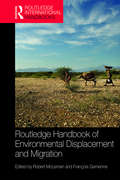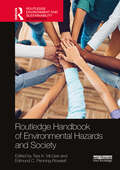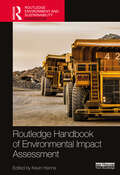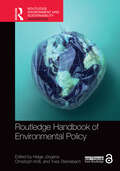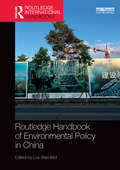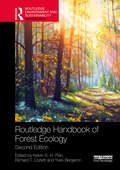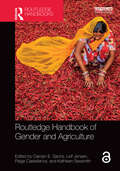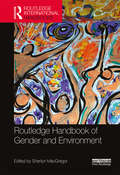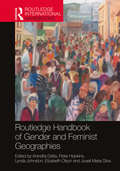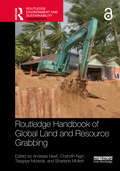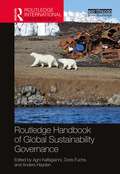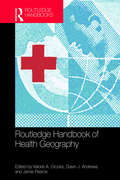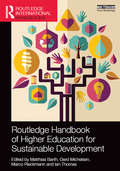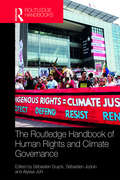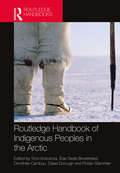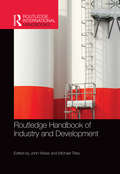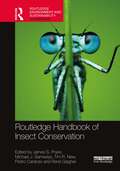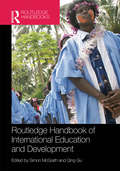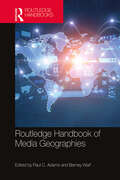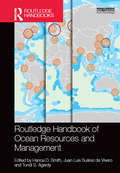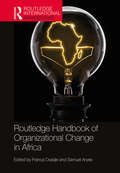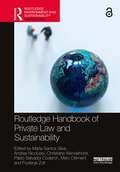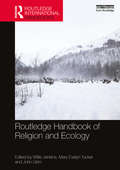- Table View
- List View
Routledge Handbook of Environmental Displacement and Migration (Routledge International Handbooks)
by Robert McLeman François GemenneThe last twenty years have seen a rapid increase in scholarly activity and publications dedicated to environmental migration and displacement, and the field has now reached a point in terms of profile, complexity, and sheer volume of reporting that a general review and assessment of existing knowledge and future research priorities is warranted. So far, such a product does not exist. The Routledge Handbook of Environmental Displacement and Migration provides a state-of-the-science review of research on how environmental variability and change influence current and future global migration patterns and, in some instances, trigger large-scale population displacements. Drawing together contributions from leading researchers in the field, this compendium will become a go-to guide for established and newly interested scholars, for government and policymaking entities, and for students and their instructors. It explains theoretical, conceptual, and empirical developments that have been made in recent years; describes their origins and connections to broader topics including migration research, development studies, and international public policy and law; and highlights emerging areas where new and/or additional research and reflection are warranted. The structure and the nature of the book allow the reader to quickly find a concise review relevant to conducting research or developing policy on particular topics, and to obtain a broad, reliable survey of what is presently known about the subject.
Routledge Handbook of Environmental Hazards and Society (Routledge Environment and Sustainability Handbooks)
by Edmund C. Penning-Rowsell Tara K. McGeeThis Handbook provides a state-of-the-science review of research and practice in the human dimensions of hazards field. The Routledge Handbook of Environmental Hazards and Society reviews and assesses existing knowledge and explores future research priorities in this growing field. It showcases the work of international experts, including established researchers, future stars in the field, and practitioners. Organised into four parts, all chapters have an international focus, and many include case studies from around the world. Part I explains geophysical and hydro-meteorological/climatological hazards, their impacts, and mitigation. Part II explores vulnerability, resilience, and equity. Part III explores preparedness, responses during environmental hazard events, impacts, and the recovery process. Part IV explores policy and practice, including governments, support provided during and after environmental hazard events, and provision of information. This Handbook will serve as an important resource for students, academics, practitioners, and policymakers working in the fields of environmental hazards and disaster risk reduction.
Routledge Handbook of Environmental Impact Assessment (Routledge Environment and Sustainability Handbooks)
by Kevin HannaGlobally, environmental impact assessment (EIA) is one of the most enduring and influential environmental management tools. This handbook provides readers with a strong foundation for understanding the practice of EIA, by outlining the different types of assessment while also providing a guide to best practice. This collection deploys a research and practice-based approach to the subject, delivering an overview of EIA as an essential and practical tool of environmental protection, planning, and policy. To best understand the most pertinent issues and challenges surrounding EIA today, this volume draws together prominent researchers, practitioners, and young scholars who share their work and knowledge to cover two key parts. The first part introduces EIA processes and best practices through analytical and critical chapters on the stages/elements of the EIA process and different components and forms of assessment. These provide examples that cover a wide range of assessment methods and cross-cutting issues, including cumulative effects assessment, social impact assessment, Indigenous-led assessment, risk assessment, climate change, and gender-based assessment. The second part provides jurisdictional reviews of the European Union, the US National Environmental Policy Act, recent assessment reforms in Canada, EIA in developing economies, and the EIA context in England. By providing a concise outline of the process followed by in-depth illustrations of approaches, methods and tools, and case studies, this book will be essential for students, scholars, and practitioners of environmental impact assessment.
Routledge Handbook of Environmental Policy (Routledge Environment and Sustainability Handbooks)
by Helge Jörgens Christoph Knill Yves SteinebachThis Handbook provides a state-of-the-art review of research on environmental policy and governance. The Routledge Handbook of Environmental Policy has a strong focus on new problem structures – a perspective that emphasizes the preconditions and processes of environmental policymaking – and a comparative approach that covers all levels of local, national, and global policymaking. The volume examines the different conditions under which environmental policymaking takes place in different regions of the world and tracks the theoretical, conceptual, and empirical developments that have been made in recent years. It also highlights emerging areas where new and/or additional research and reflection are warranted. Divided into four key parts, the accessible structure and the nature of the contributions allow the reader to quickly find a concise expert review on topics that are most likely to arise in the course of conducting research or developing policy, and to obtain a broad, reliable survey of what is presently known about the subject. The resulting compendium is an essential resource for students, scholars, and policymakers working in this vital field.
Routledge Handbook of Environmental Policy in China (Routledge Environment and Sustainability Handbooks)
by Eva SternfeldDuring the last few decades, China has accomplished unprecedented economic growth and has emerged as the second largest economy in the world. This ‘economic miracle’ has led hundreds of millions of people out of poverty, but has also come at a high cost. Environmental degradation and the impact of environmental pollution on health are nowadays issues of the greatest concern for the Chinese public and the government. The Routledge Handbook of Environmental Policy in China focuses on the environmental challenges of China’s rapidly growing economy and provides a comprehensive overview of the policies developed to address the environmental crisis. Leading international scholars and practitioners examine China’s environmental governance efforts from an interdisciplinary perspective. Divided into five parts, the handbook covers the following key issues: Part I: Development of Environmental Policy in China - Actors and Institutions Part II: Key issues and Strategies for Solution Part III: Policy Instruments and Enforcement Part IV: Related Policy Fields – Conflicts and Synergies Part V: China’s Environmental Policy in the International Context This comprehensive handbook will be an invaluable resource to students and scholars of environmental policy and politics, development studies, Chinese studies, geography and international relations.
Routledge Handbook of Forest Ecology (Routledge Environment and Sustainability Handbooks)
by Richard T. Corlett Yves Bergeron Pehm, Kelvin S.-H.The Routledge Handbook of Forest Ecology is an essential resource covering all aspects of forest ecology from a global perspective.This new edition has been fully revised and updated throughout to reflect the profound and unprecedented changes in both forests and climates since the publication of the first edition in 2015. The handbook reflects key developments in the field of forest dynamics and large-scale processes, as well as the changes that are now manifesting in different types of forests across the globe as a result of climate change. It covers both natural and managed forests, from boreal, temperate, sub-tropical and tropical regions of the world. In this second edition, the breadth of the handbook has been expanded with new chapters on mountain forests, monodominance, pathogens and invertebrate pests and amphibians and reptiles in forest ecosystems. Original author teams are complemented by the addition of new authors to offer fresh perspectives, and the second edition places greater emphasis on the applicability of each topic at a global level. The handbook is divided into seven parts:• Part I: The forest• Part II: Forest dynamics• Part III: Forest flora and fauna• Part IV: Energy and nutrients• Part V: Forest conservation and management• Part VI: Forest and climate change• Part VII: Human ecologyThe Routledge Handbook of Forest Ecology is an essential reference text for a wide range of students and scholars of ecology, environmental science, forestry, geography and natural resource management.
Routledge Handbook of Gender and Agriculture
by Carolyn E. Sachs, Leif Jensen, Paige Castellanos, and Kathleen SexsmithThe Routledge Handbook of Gender and Agriculture covers major theoretical issues as well as critical empirical shifts in gender and agriculture. Gender relations in agriculture are shifting in most regions of the world with changes in the structure of agriculture, the organization of production, international restructuring of value chains, climate change, the global pandemic, and national and multinational policy changes. This book provides a cutting-edge assessment of the field of gender and agriculture, with contributions from both leading scholars and up-and-coming academics as well as policymakers and practitioners. The handbook is organized into four parts: part 1, institutions, markets, and policies; part 2, land, labor, and agrarian transformations; part 3, knowledge, methods, and access to information; and part 4, farming people and identities. The last chapter is an epilogue from many of the contributors focusing on gender, agriculture, and shifting food systems during the coronavirus pandemic. The chapters address both historical subjects as well as ground-breaking work on gender and agriculture, which will help to chart the future of the field. The handbook has an international focus with contributions examining issues at both the global and local levels with contributors from across the world. With contributions from leading academics, policymakers, and practitioners, and with a global outlook, the Routledge Handbook of Gender and Agriculture is an essential reference volume for scholars, students, and practitioners interested in gender and agriculture.
Routledge Handbook of Gender and Environment (Routledge Environment and Sustainability Handbooks)
by Sherilyn MacgregorThe Routledge Handbook of Gender and Environment gathers together state-of-the-art theoretical reflections and empirical research from leading researchers and practitioners working in this transdisciplinary and transnational academic field. Over the course of the book, these contributors provide critical analyses of the gender dimensions of a wide range of timely and challenging topics, from sustainable development and climate change politics, to queer ecology and interspecies ethics in the so-called Anthropocene. Presenting a comprehensive overview of the development of the field from early political critiques of the male domination of women and nature in the 1980s to the sophisticated intersectional and inclusive analyses of the present, the volume is divided into four parts: Part I: Foundations Part II: Approaches Part III: Politics, policy and practice Part IV: Futures. Comprising chapters written by forty contributors with different perspectives and working in a wide range of research contexts around the world, this Handbook will serve as a vital resource for scholars, students, and practitioners in environmental studies, gender studies, human geography, and the environmental humanities and social sciences more broadly.
Routledge Handbook of Gender and Feminist Geographies (Routledge International Handbooks)
by Elizabeth Peter Johnston Datta Anindita Hopkins Lynda Olson Joseli Maria SilvaThis handbook provides a comprehensive analysis of contemporary gender and feminist geographies in an international and multi-disciplinary context. It features 48 new contributions from both experienced and emerging scholars, artists and activists who critically review and appraise current spatial politics. Each chapter advances the future development of feminist geography and gender studies, as well as empirical evidence of changing relationships between gender, power, place and space. Following an introduction by the Editors, the handbook presents original work organized into four parts which engage with relevant issues including violence, resistance, agency and desire: Establishing feminist geographies Placing feminist geographies Engaging feminist geographies Doing feminist geographies The Routledge Handbook of Gender and Feminist Geographies will be an essential reference work for scholars interested in feminist geography, gender studies and geographical thought.
Routledge Handbook of Gender and Water Governance (Routledge Environment and Sustainability Handbooks)
by Margreet Zwarteveen Tatiana Acevedo-Guerrero Lisa Bossenbroek Irene Leonardelli Seema KulkarniThis handbook provides a comprehensive overview of the field of gender and water governance, exploring how the use, management and knowledge of water resources, services and the water environment are deeply gendered.In water there is a recognized gender gap between water responsibilities and water rights and bridging this gap is likely to help achieve not just goals of equity but also those of sustainability. Building on a rich legacy of feminist water scholarship, the Routledge Handbook of Gender and Water Governance is a collection of reflections and studies that can be used as a prismatic lens into a thriving and ever proliferating array of feminist water studies. It provides a clear testimony of how hydrofeminism has evolved from rather instrumental gender and water studies to scholarship that uses feminist tools to pry open, critically reflect on and formulate alternatives to water development-as-usual. The book also shows how the community of feminists interested in studying water has diversified and expanded, from often white female scholars studying projects and gender relations in the so-called Global South, to a varied mix of scholars and activists theorizing from diverse geographical and political locations – prominently including the body. It is organized into five interconnected parts: Part I: Positionality and embodied waters Part II: Revisiting water debates: diplomacy, security, justice and heritage Part III: Sanitation stories Part IV: Precarious livelihoods Part V: New feminist futures Each of these parts brings out the gendered nature of water, shedding light on the often neglected care and unpaid labour of women and its relationship with extractivism and socioeconomic inequalities. The overall aim of the handbook is to apply social science insights to water governance challenges, creating synergies and linkages between different disciplines and scientific domains.The Routledge Handbook of Gender and Water Governance is essential reading for students, scholars and professionals interested in water governance, water security, health and sanitation, gender studies and sustainable development more broadly.
Routledge Handbook of Global Land and Resource Grabbing (Routledge Environment and Sustainability Handbooks)
by Sharlene Mollett Andreas Neef Chanrith Ngin Tsegaye MoredaThis handbook provides a cutting-edge, comprehensive overview of global land and resource grabbing. Global land and resource grabbing has become an increasingly prominent topic in academic circles, among development practitioners, human rights advocates, and in policy arenas. The Routledge Handbook of Global Land and Resource Grabbing sustains this intellectual momentum by advancing methodological, theoretical and empirical insights. It presents and discusses resource grabbing research in a holistic manner by addressing how the rush for land and other natural resources, including water, forests and minerals, is intertwined with agriculture, mining, tourism, energy, biodiversity conservation, climate change, carbon markets, and conflict. The handbook is truly global and interdisciplinary, with case studies from the Global South and Global North, and chapter contributions from practitioners, activists and academics, with emerging and Indigenous authors featuring strongly across the chapters. The handbook will be essential reading for students and scholars interested in land and resource grabbing, agrarian studies, development studies, critical human geography, global studies and natural resource governance.
Routledge Handbook of Global Sustainability Governance (Routledge International Handbooks)
by Anders Hayden Agni Kalfagianni Doris FuchsThe Routledge Handbook of Global Sustainability Governance provides a state-of-the-art review of core debates and contributions that offer a more normative, critical, and transformatively aspirational view on global sustainability governance. In this landmark text, an international group of acclaimed scholars provides an overview of key analytical and normative perspectives, material and ideational structural barriers to sustainability transformation, and transformative strategies. Drawing on pivotal new and contemporary research, the volume highlights aspects to be considered and blind spots to be avoided when trying to understand and implement global sustainability governance. In this context, the authors of this book debunk many myths about all-too optimistic accounts of progress towards a sustainability transition. Simultaneously, they suggest approaches that have the potential for real sustainability transformation and systemic change, while acknowledging existing hurdles. The wide-ranging chapters in the collection are organised into four key parts: • Part 1: Conceptual lenses • Part 2: Ethics, principles, and debates • Part 3: Key challenges • Part 4: Transformative approaches This handbook will serve as an important resource for academics and practitioners working in the fields of sustainability governance and environmental politics.
Routledge Handbook of Health Geography
by Jamie Pearce Gavin J. Andrews Valorie A. CrooksThe places of our daily life affect our health, well-being, and receipt of health care in complex ways. The connection between health and place has been acknowledged for centuries, and the contemporary discipline of health geography sets as its core mission to uncover and explicate all facets of this connection. The Routledge Handbook of Health Geography features 52 chapters from leading international thinkers that collectively characterize the breadth and depth of current thinking on the health–place connection. It will be of interest to students seeking an introduction to health geography as well as multidisciplinary health scholars looking to explore the intersection between health and place. This book provides a coherent synthesis of scholarship in health geography as well as multidisciplinary insights into cutting-edge research. It explores the key concepts central to appreciating the ways in which place influences our health, from the micro-space of the body to the macro-scale of entire world regions, in order to articulate historical and contemporary aspects of this influence.
Routledge Handbook of Higher Education for Sustainable Development (Routledge International Handbooks)
by Ian Thomas Gerd Michelsen Matthias Barth Marco RieckmannThe Routledge International Handbook of Higher Education for Sustainable Development gives a systematic and comprehensive overview of existing and upcoming research approaches for higher education for sustainable development. It provides a unique resource for researchers engaged in the field of higher education for sustainable development by connecting theoretical aspects of the range of relevant methodologies, showing the interdisciplinary aspects of the research field and illustrating the breadth of research directions. With a team of international authors from leading universities in research and teaching in higher education for sustainable development this Handbook brings together a broad range of research approaches and shows how these approaches are reflected in the research practice in higher education for sustainable development. Key topics include: Research Paradigms and Methodologies Ongoing and Future Directions of Research Meta-Analysis and Reviews Policy and Politics Challenges for Implementation Action Research and Transdisciplinary Perspective Gender, Diversity and Post-Colonial Perspectives Operationalising Competencies Outcome-Oriented Research Curriculum Change Organisational Change and Organisational Learning Community and Partnerships University Appraisal Systems and Indicators Evaluation Approaches Engaging Academic Teachers Good Practice Learning and Teaching Transformative Leadership and Change Strategies This Handbook is an invaluable research and teaching tool for all those working in higher education for sustainable development.
Routledge Handbook of Human Rights and Climate Governance (Routledge International Handbooks)
by Sébastien Jodoin Sébastien Duyck Alyssa JohlOver the last decade, the world has increasingly grappled with the complex linkages emerging between efforts to combat climate change and to protect human rights around the world. The Paris Climate Agreement adopted in December 2015 recognized the necessity for governments to take into consideration their human rights obligations when taking climate action. However, important gaps remain in understanding how human rights can be used in practice to develop and implement effective and equitable solutions to climate change at multiple levels of governance. This book brings together leading scholars and practitioners to offer a timely and comprehensive analysis of the opportunities and challenges for integrating human rights in diverse areas and forms of global climate governance. The first half of the book explores how human rights principles and obligations can be used to reconceive climate governance and shape responses to particular aspects of climate change. The second half of the book identifies lessons in the integration of human rights in climate advocacy and governance and sets out future directions in this burgeoning domain. Featuring a diverse range of contributors and case studies, this Handbook will be an essential resource for students, scholars, practitioners and policy makers with an interest in climate law and governance, human rights and international environmental law.
Routledge Handbook of Indigenous Peoples in the Arctic (Routledge International Handbooks)
by Timo Koivurova Dorothée Cambou Else Grete Broderstad Dalee Dorough Florian StammlerThis handbook brings together the expertise of Indigenous and non-Indigenous scholars to offer a comprehensive overview of issues surrounding the well-being, self-determination and sustainability of Indigenous peoples in the Arctic. Offering multidisciplinary insights from leading figures, this handbook highlights Indigenous challenges, approaches and solutions to pressing issues in Arctic regions, such as a warming climate and the loss of biodiversity. It furthers our understanding of the Arctic experience by analyzing how people not only survive but thrive in the planet’s harshest climate through their innovation, ingenuity and agency to tackle rapidly changing environments and evolving political, social, economic and cultural conditions. The book is structured into three distinct parts that cover key topics in recent and future research with Indigenous Peoples in the Arctic. The first part examines the diversity of Indigenous peoples and their cultural expressions in the different Arctic states. It also focuses on the well-being of Indigenous peoples in the Arctic regions. The second part relates to the identities and livelihoods that Indigenous peoples in Arctic regions derive from the resources in their environments. This interconnection between resources and people’s identities underscores their entitlements to use their lands and resources. The third and final part provides insights into the political involvement of Indigenous peoples from local all the way to the international level and their right to self-determination and some of the recent related topics in this field. This book offers a novel contribution to Arctic studies, empowering Indigenous research for the future and rebuilding the image of Indigenous peoples as proactive participants, signaling their pivotal role in the co-production of knowledge. It will appeal to scholars and students of law, political sciences, geography, anthropology, Arctic studies and environmental studies, as well as policy-makers and professionals.
Routledge Handbook of Industry and Development (Routledge International Handbooks)
by John Weiss Michael TribeThe Routledge Handbook of Industry and Development is a global overview of industrialisation. Each chapter will provide readers with contemporary insights into this this essential aspect of economic development. Industrialisation has been at the forefront of discussion on economic development since the earliest days of development economics. But over the last fifty years, the manufacturing sectors of different countries and regions have grown at strikingly different rates. In 1960 developing countries took a very small share of global manufacturing production. Today the position had changed radically with fast growth of manufacturing in many parts of what was originally the developing world, particularly in China and the rest of East Asia. On the other hand, countries in Africa and parts of Latin America have been largely left behind by this process of industrialisation. This volume aims to illuminate this uneven development and takes stock of the current issues that hinder and support industrialisation in low and middle income economies. This Handbook is a collection of chapters on different aspects of industrialisation experience in a range of countries. Key themes include, the role of manufacturing in growth, the nature of structural change at different stages of development, the role of manufacturing in employment creation, alternative options for trade and industrial policy, the key role of technology and technical change, and the impact of globalisation and the spread of global value chains and foreign direct investment on prospects for industrialisation. Several chapters discuss individual country experiences with examples from India, Mexico, South Africa and Tanzania, as well as an overview of African industrialisation. This authoritative Handbook will be a key reference source for those studying or wishing to understand contemporary economic development. Offering inspiration and direction for future research, this landmark volume will be of crucial importance to all development economics scholars and researchers.
Routledge Handbook of Insect Conservation (Routledge Environment and Sustainability Handbooks)
by Tim R. New James S. Pryke Michael J. Samways Pedro Cardoso René GaigherThis handbook presents a comprehensive overview of insect conservation and provides practical solutions to counteract insect declines, at a time where insects are facing serious threats across the world from habitat destruction to invasive species and climate change.The Routledge Handbook of Insect Conservation consist of six sections, covering all aspects of insect conservation, containing contributions from academics, researchers and practitioners from across the globe. Section I addresses the fundamentals of insect conservation and outlines the reason why insects are important and discusses the greatest drivers of insect decline. The chapters in Section II examine the approaches that can be used for insect conservation globally, such as protected areas and agroecology, while highlighting the importance of insects in the composition and function of ecosystems. The chapters in Section III focus on insect populations in the major biomes around the world, from temperate and tropical forests to savannas and grasslands, with the chapters in Section IV focusing on natural and manmade ecosystems of the world, including mountain, soil, urban, island and agricultural habitats. They discuss the unique pressures and challenges for each biome and ecosystem and offer practical solutions for conserving their insect populations. Section V focuses on the assessment and monitoring of insects for conservation, discussing how we can implement practical monitoring protocols and what options are available. A wide variety of methods and tools are examined, including citizen science, bioindication, the role of taxonomy, drones and eDNA. The book concludes by examining policy and education strategies for insect conservation in Section VI. The chapters discuss key issues around social and policy strategies and conservation legislation for ensuring the long-term protection of insects.This book is essential reading for students and scholars of biodiversity conservation and entomology as well as professionals and policymakers involved in conservation looking for real-world solutions to the threats facing insects across the globe.
Routledge Handbook of International Education and Development (Routledge International Handbooks)
by Simon McGrath & Qing GuThis timely Handbook takes stock of the range of debates that characterise the field of international education and development, and suggests key aspects of a research agenda for the next period. It is deliberately divergent in its approach, recognising the major ideological and epistemological divides that characterise a field that draws on many traditions. Leading and emergent voices from different paradigms and contexts are afforded a space to be heard and each section puts current debates in larger historical contexts. The Handbook is divided in four parts and book-ended by an introduction and a conclusion, the latter oriented towards the implications that the volume has for future research agendas. The first part explores major strands of debates about education’s place in development theory. The second acknowledges the disciplining of the field by the education for all movement and examines the place that learning and teaching, and schools play in development. Part three looks beyond schools to consider early years, adult and vocational education but focuses particularly on the return to thinking about higher education's role in development. The final part considers the changing, but still important, role that international cooperation plays in shaping education in developing countries. Featuring over thirty chapters written by leading international and interdisciplinary scholars, the Routledge Handbook of International Education and Development offers the first comprehensive and forward-looking resource for students and scholars.
Routledge Handbook of Latin America and the Environment (Routledge International Handbooks)
by Salvatore Engel-Di Mauro Beatriz Bustos Gustavo García-López Felipe Milanez Diana OjedaThe Routledge Handbook of Latin America and the Environment provides an in-depth and accessible analysis and theorization of environmental issues in the region. It will help readers make connections between Latin American and other regions’ perspectives, experiences, and environmental concerns. Latin America has seen an acceleration of environmental degradation due to the expansion of resource extraction and urban areas. This Handbook addresses Latin America not only as an object of study, but also as a region with a long and profound history of critical thinking on these themes. Furthermore, the Handbook departs from most treatments on the topic by studying the environment as a social issue inextricably linked to politics, economy, and culture. The Handbook will be an invaluable resource for those wanting not only to understand the issues, but also to engage with ideas about environmental politics and social-ecological transformation. The Handbook covers a broad range of topics organized according to three areas: physical geography, ecology, and crucial environmental problems of the region. These are key theoretical and methodological issues used to understand Latin America’s ecosocial contexts, and institutional and grassroots practices related to more just and ecologically sustainable worlds. The Handbook will set a research agenda for the near future and provide comprehensive research on most subregions relative to environmental transformations, challenges, struggles and political processes. It stands as a fresh and much needed state of the art introduction for researchers, scholars, post-graduates and academic audiences on Latin American contributions to theorization, empirical research and environmental practices.
Routledge Handbook of Media Geographies
by Paul C. AdamsThis Handbook offers a comprehensive overview of media geography, focusing on a range of different media viewed through the lenses of human geography and media theory. It addresses the spatial practices and processes associated with both old and new media, considering "media" not just as technologies and infrastructures, but also as networks, systems and assemblages of things that come together to enable communication in the real world. With contributions from academics specializing in geography and media studies, the Routledge Handbook of Media Geographies summarizes the recent developments in the field and explores key questions and challenges affecting various groups, such as women, minorities, and persons with visual impairment. It considers geographical aspects of disruptive media uses such as hacking, fake news, and racism. Written in an approachable style, chapters consider geographies of users, norms, rules, laws, values, attitudes, routines, customs, markets, and power relations. They shed light on how mobile media make users vulnerable to tracking and surveillance but also facilitate innovative forms of mobility, space perception and placemaking. Structured in four distinct sections centered around "control and access to digital media," "mass media," "mobile media and surveillance" and "media and the politics of knowledge," the Handbook explores digital divides and other manifestations of the uneven geographies of power. It also includes an overview of the alternative social media universe created by the Chinese government. Media geography is a burgeoning field of study that lies at the intersections of various social sciences, including human geography, political science, sociology, anthropology, communication/media studies, urban studies, and women and gender studies. Academics and students across these fields will greatly benefit from this Handbook.
Routledge Handbook of Ocean Resources and Management (Routledge Environment and Sustainability Handbooks)
by Hance D. Smith Tundi S. Agardy Juan Luis Suárez de ViveroThis comprehensive handbook provides a global overview of ocean resources and management by focusing on critical issues relating to human development and the marine environment, their interrelationships as expressed through the uses of the sea as a resource, and the regional expression of these themes. The underlying approach is geographical, with prominence given to the biosphere, political arrangements and regional patterns – all considered to be especially crucial to the human understanding required for the use and management of the world's oceans. Part one addresses key themes in our knowledge of relationships between people and the sea on a global scale, including economic and political issues, and understanding and managing marine environments. Part two provides a systematic review of the uses of the sea, grouped into food, ocean space, materials and energy, and the sea as an environmental resource. Part three on the geography of the sea considers management strategies especially related to the state system, and regional management developments in both core economic regions and the developing periphery. The primary themes within each chapter are governance (including institutional and legal bases); policy – sets of ideas governing management; and management, both technical and general.
Routledge Handbook of Organizational Change in Africa (Routledge International Handbooks)
by Franca Ovadje Samuel AryeeAlthough change management and therefore effective adaptation to environmental complexity is considered a uniquely human cultural activity, the extensive change management literature is largely based on the experiences of organizations in the advanced economies of the West. As the economies of African countries become increasingly open, African organizations will need to be agile in order to adapt and grow in a dynamic, global environment. Currently, there is a dearth of contextualized knowledge on change management within Africa, but this handbook aims to address this by bringing together a wide range of experts to explore organizational change and change management from an African context. The handbook adopts a multidisciplinary (historical, philosophical, processual, and strategic) perspective as well as empirical accounts of change management. It addresses such issues as: What are the external and internal pressures for change? What is the content and process of change management? What are the essentials of effective change management? How can change management be theorized from an African perspective? What sort of leadership can best align with change management demands in an African context? How do organizations build internal change management capability? It is hoped that answers to these questions contained in the handbook will provide a contextualized understanding of change management which African organizations and scholars can leverage to respond to the threats and opportunities inherent in their increasingly dynamic environment. The handbook should constitute an essential reference for academics, researchers, and advanced students of change management, development studies, and African studies, as well as practitioners.
Routledge Handbook of Private Law and Sustainability (Routledge Environment and Sustainability Handbooks)
by Marta Santos Silva Andrea Nicolussi Christiane Wendehorst Pablo Salvador Coderch Marc Clément Fryderyk ZollThe Routledge Handbook of Private Law and Sustainability reflects on how the law can help tackle the current environmental challenges and make our societies more resilient to future crises.Sustainability has been high on the political agenda since the approval of the Sustainable Development Goals in 2015 and the EU Green Deal in 2019. The Green Agenda aims at making Europe the first climate‑neutral continent by 2050, but humanity persists in an ecological overshoot that puts at risk the survival of species, including that of our own. Drawing together a selection of leading thinkers in the field, this Handbook provides a curated overview of the most recent and relevant discussions for private lawyers related to environmental and sustainability concerns. The authors delve into case study examples from 20 countries in Europe and beyond and discuss a wide range of issues, including new property law and consumer law paradigms, the use of legal tech for promoting sustainable property management, strategies for fighting planned obsolescence, eco‑design, the servitisation economy, advances on corporate climate litigation and mandated green private sludges. Overall, the volume is designed to empower new generations of legal scholars to take an active role in the transition to a more sustainable future. It will also assist policymakers in producing better policy, through pinpointing the main legal issues that need to be addressed and offering a comparative overview of legal solutions and best practices.Divided into six key parts and overseen by a team of internationally recognised expert editors, this Handbook will be an essential resource for students, scholars, private lawyers and policymakers who wish to have a comprehensive, fundamental overview of how environmental sustainability concerns reflect on private law.
Routledge Handbook of Religion and Ecology (Routledge Environment and Sustainability Handbooks)
by Willis Jenkins, Mary Evelyn Tucker and John GrimThe moral values and interpretive systems of religions are crucially involved in how people imagine the challenges of sustainability and how societies mobilize to enhance ecosystem resilience and human well-being. The Routledge Handbook of Religion and Ecology provides the most comprehensive and authoritative overview of the field. It encourages both appreciative and critical angles regarding religious traditions, communities, attitude, and practices. It presents contrasting ways of thinking about "religion" and about "ecology" and about ways of connecting the two terms. Written by a team of leading international experts, the Handbook discusses dynamics of change within religious traditions as well as their roles in responding to global challenges such as climate change, water, conservation, food and population. It explores the interpretations of indigenous traditions regarding modern environmental problems drawing on such concepts as lifeway and indigenous knowledge. This volume uniquely intersects the field of religion and ecology with new directions within the humanities and the sciences. This interdisciplinary volume is an essential reference for scholars and students across the social sciences and humanities and for all those looking to understand the significance of religion in environmental studies and policy.
